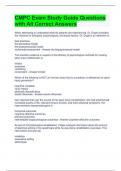CMPC Exam Study Guide Questions
with All Correct Answers
When attempting to understand what his patients are experiencing, Dr. Engel considers
the influence of biological, psychological, and social factors. Dr. Engel is an adherent of:
best practices
the biomedical model
the biopsychosocial model
multimodal assessment - Answer-the biopsychosocial model
The scientific evidence in support of the efficacy of psychological methods for treating
sport-injury related pain is:
limited
extensive
conflicting
nonexistent - Answer-limited
Which of the following is NOT an intrinsic factor that is a predictor of adherence for sport
injury prevention?
cognitive variables
injury history
personal characteristics
social influences - Answer-social influences
Geri reported that over the course of her sport injury rehabilitation, she had experienced
increased quality of life, reduced reinjury anxiety, and fewer physical symptoms. Her
improvements represented gains in
functional outcomes
cognitive-affective outcomes
physical outcomes
intermediate biopsychological outcomes - Answer-cognitive-affective outcomes
As part of his postsurgical rehabilitation, Felipe received information about the amount
of electrical activity in his quadriceps while he was doing rehabilitation exercises. This
intervention is known as:
modeling
expressive writing
electrolysis
,biofeedback - Answer-biofeedback
3 approaches to conceptual orientations - Answer-(a) experiential and relationship-
oriented approaches such as person-centered therapy, existential therapy, and
emotion-focused therapy
(b) the goal-directed collaborative approach of solution-focused brief therapy
(c) three generations of cognitive behavioral approaches such as behavior therapy,
cognitive behavior therapy, rational emotive behavior therapy, mindfulness-based
therapy, acceptance and commitment therapy, compassion-focused therapy, and
dialectical behavior therapy
Systems theory - Answer-A holistic approach used to examine and understand systems.
Individuals and groups are viewed as their own ecosystem with many moving parts that
affect each other. With the notion that the whole is greater than the sum of its parts, the
aim of systems therapy is to help members of a system gain insight into how each
member's role within the system may affect its functionality.
Change processes - Answer-The transtheoretical model and the theory of planned
behavior are two classic and dominant theories of behavior change. Change processes
are at the heart of practitioners' work, whether they are related to the enhancement or
restoration of performance and mental health. Understanding how human behavior
change occurs over time, along with key factors influencing change, is fundamental to
effective practice.
Application of counseling and consulting theory to performance - Answer-Principles of
counseling and consulting can be used to enhance or restore performance in a variety
of contexts, including sport.
For instance, existential therapy can be used to help injured athletes examine whether
they should continue competing for another year.
On the other hand, the transtheoretical model can be useful for helping athletes who are
unmotivated to improve certain aspects of their performance.
Mental performance consultants (MPCs) can integrate multiple aspects of counseling
and consulting theories into their consulting philosophy and applied practice in order to
be versatile and competent in responding to various types of performance situations.
Case Question: Stephanie is a freshman student-athlete playing on her collegiate
volleyball team. She recently moved away from home for the first time and has been
finding it difficult to adapt to her new city, program of study, and sport team. Additionally,
she is experiencing an increased level of anxiety due to her feelings of inadequacy in
training and in the classroom, and she is missing her family's immediate support.
Stephanie tends to compare herself to others and to be overly critical of herself,
particularly in evaluative situations.
Her coach notices that she has been more tired, withdrawn, and unfocused than usual
and asks to speak with her after practice. Listen to the conversation that Coach
, Brownwell and Stephanie have in the coach's office. Which approach should Cassandra
use in her first session with Stephanie?
A. Use behavior therapy to work on Stephanie's elevated anxiety and sleep issue.
Teaching - Answer-B. Use person-centered therapy (PCT) to listen to and empathize
with Stephanie's story and establish trust and rapport. The main concern in this first
session is to understand Stephanie's experience and get a sense of the factors that are
contributing to it.
Counseling is defined as - Answer-The skilled and principled use of a professional
relationship to empower individuals to achieve mental health, wellness, education, and
career goals. It aims to facilitate self-knowledge, emotional acceptance and growth, and
the optimal development of personal resources
Consulting refers to - Answer-A collaborative process in which psychological,
counseling, and athletic performance principles are applied with individuals, teams, and
organizations to help them move from their current state to their desired state. The
overall aim of consulting is to facilitate the development of mental and emotional skills,
attitudes, perspectives, strategies, and processes that lead to optimal performance,
well-being, and personal growth
The delivery of effective sport and performance psychology services is based on a
strong consulting/counseling philosophy, which is characterized by - Answer-The
purpose, nature, values, beliefs, and ideals underlying practitioners' consulting and
counseling work. A practitioner's philosophy underpins the decisions regarding which
theories and principles to use in work with clients
Theories of Behavior Change - Answer-Transtheoretical model
Theory of planned behavior
Counseling Theories and Approaches - Answer-Person-centered therapy
Existential therapy
Emotion-focused therapy
Solution-focused brief therapy
Behavior therapy
Cognitive behavior therapy
Rational emotive behavior therapy
Mindfulness-based therapy
Acceptance and commitment therapy
Compassion-focused therapy
Dialectical behavior therapy
Systems theory
From a performance enhancement perspective, MPCs help clients to - Answer-Develop
the behaviors, mindset, and mental skills necessary to perform to their potential in sport.




